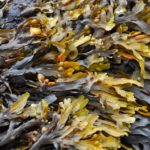Seaweed

British and Irish waters are home to 600 species of seaweed and this is more than 6% of the known species globally
They are incredibly important ecologically and provide both food and shelter for numerous creatures
And we are one of the “creatures” that can benefit from seaweeds as they are packed with minerals and goodness and make a great addition
to a vegan diet – but be cautious – over foraging on some of the more accessible seaweeds can cause a decline in their numbers. Just as we are no longer encouraged to pick wild flowers these days, it should be the same with seaweed, nature is under so much pressure and it needs us to act responsibly. Some seaweeds can be farmed easily and maybe this is the way forward.
However, here in Wales, one of the traditional Welsh foods is seaweed – or Laverbread – in Welsh, bara lawnr. Purple Laver seaweed collected and formed into a pat, suitable for rolling in oatmeal and frying in butter for breakfast. I can remember my Uncle going to Swansea especially to buy Laverbread and having it for breakfast the following morning.
Here are some of the most popular seaweeds:
Bladder Wrack
Knotted Wrack
Spiral Wrack
Serrated Wrack
Oarweed
Sugar Kelp
Sea Lettuce
Gutweed
Purple Laver – which Laverbread is made from – also known as Nori in other countries and use in Sushi
Carrageen
Athene English